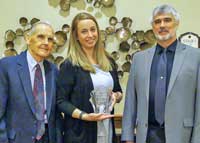Newscap
A bimonthly newsletter of WICHE highlights and activities
April 2019 Edition
Behavioral Health VP Mohatt honored for community psychology contributions by APA division

Dennis Mohatt, WICHE vice president for behavioral health, was nominated and selected for the 2019 Distinguished Contributions to Practice in Community Psychology Award by the Society for Community Research and Action (SCRA), American Psychological Association Division 27 representing the field of community psychology.
Mohatt received the honor based on his career-long efforts helping to create, collaborate on, and advocate for mental health services in rural communities, optimizing their administrative and service strategies, and making important research and scholarship contributions to community psychology. He will be honored and give a talk at an award ceremony at SCRA’s biennial conference June 26-29 in Chicago. The address will also be published in the American Journal of Community Psychology.
Mohatt has served WICHE since 2001, leading collaborative work across the WICHE region. He received his undergraduate training at the University of Oregon, and an NIMH training fellowship in rural mental health at Mansfield University in Pennsylvania, where he earned a master’s degree in rural community-clinical psychology. As a discipline, community psychology focuses on efforts for which collaboration is key to action. “It’s why I have this job,” he says. “I use those skills every day.”
Arizona’s efforts to increase postsecondary attainment now in full swing

Seventy-five organizations and 40 municipalities in Arizona have joined forces to advance the goal of increasing the share of adults with postsecondary degrees or credentials to 60 percent over the next decade. The Achieve60AZ alliance recently released the first in a series of State of Attainment reports tracking progress toward that goal.
A key component of Arizona’s agenda is its participation on the WICHE Task Force on Closing Postsecondary Attainment Gaps, a two-year initiative funded by Lumina Foundation aimed at increasing higher education success among underserved students. WICHE is working with an array of stakeholders in Arizona and Wyoming, to develop state-specific action plans and ultimately craft regional recommendations for closing equity gaps. The task force’s work began last fall with roundtable discussions in Yuma, Tucson, and Phoenix that were designed to gain a better understanding of the state’s equity gaps from the perspective of rural, Latino, and Native American communities.
Postsecondary institutions: Be part of major WICHE/CAEL study of prior learning assessment
The Council for Adult and Experiential Learning (CAEL) and WICHE seek the participation of at least 70 colleges and universities in a research study on policies and practices involving assessment of prior learning. Participating institutions will be asked to complete a questionnaire and share data on persistence, degree completion, and other student outcomes. A stipend of $2,500 will be given to each institution that contributes to the study.
The study kicks off a national 18-month initiative focused on recognition of learning—a term that encompasses varied ways students can be granted academic credit for prior knowledge gained outside the classroom (whether through life experience, military training, volunteerism, or other avenues). The goal of the project, supported by Lumina Foundation and Strada Education Network, is to explore ways to better assess traditionally undervalued facets of learning, and to identify policies and practices that can enable the affordable scaling of such assessments to benefit students, institutions, and states alike.
To learn about participating in the study, contact Sarah Leibrandt at 303.541.0221, or visit cael-wiche-pla.org.
WICHE Commission news
WICHE is pleased to welcome five commissioners newly appointed in recent weeks:
- John Arnold, executive director, Arizona Board of Regents
- Jim Chavez, executive director, Latin American Educational Foundation
- F. Ann Millner, senator, Utah State Legislature
- Angie Paccione, executive director, Colorado Department of Higher Education
- Thom Reilly, chief executive officer, Nevada System of Higher Education
Additionally, we salute WICHE Commissioner Dianne Harrison, president of California State University, Northridge, recently named Woman of the Year for the state’s 18th Senate District.
WCET Leadership Summit will spotlight public/private workforce-readiness partnerships

Each summer, the WICHE Cooperative for Educational Technologies (WCET) convenes thought-leaders from higher education, government, and industry for deep-dive discussions on a single challenging issue. The June 4-5, 2019 WCET Leadership Summit in Newport Beach, Calif. will address the national conversation about postsecondary institutions’ role in producing “workforce-ready” students and the increasingly competitive market of alternative-credential providers.
The summit will offer attendees a look at a variety of new and emerging partnerships designed to more closely align postsecondary programs employer expectations and needs, and to enhance use of technology-enhanced learning. Register nowfor the summit, open to all; registration is capped at 150.
Abbiatti to retire from WCET; McGill to be interim head; apply by 4/26 for WCET long-term role


With bittersweet emotions, we soon bid farewell to Mike Abbiatti, who will retire as executive director of WCET and vice president for technology-enhanced education of WICHE later this month. He has been instrumental in many advancements both for WCET and for WICHE, including cybersecurity awareness, IT infrastructure issues, and alliance-building with key technology and education organizations. Here at WICHE, we will miss Mike’s frequent military references to SITREPs, AARs, Challenge Coins, as well as his championing of Burning Man: and, most of all, his championing of his staff and their professional growth.
Beginning May 1, WCET’s interim executive director will be Mollie McGill, a WICHE veteran who was key in the founding of WCET in 1989 and more recently (as senior director of operations and membership) has led myriad WCET efforts to help colleges and universities accelerate the adoption of technology-enhanced learning. She was instrumental in securing support from the Bill & Melinda Gates Foundation for WCET’s role as the intermediary organization to the Every Learner Everywhere network.
Meanwhile: Are you a higher education leader with a zest for innovation and collaboration, and a desire to support student success by helping institutions navigate emerging technology’s opportunities and challenges? We’re now accepting applicants for the dual role of Executive Director, WCET, and VP for Technology-Enhanced Learning, WICHE. Apply by Friday, April 26 for the Boulder, Colo.-based position through the WICHE Jobs Portal.
Williston (N.D.) State College honored for first-term advising program

for student affairs at WSC,
accepted the
Bernice Joseph Award
The Western Alliance of Community College Academic Leaders recently presented the 2019 Bernice Joseph Award to North Dakota’s Williston State College for an advising program that provides support and guidance for first-term students. The program was the lead submission this past year to the Academic Leaders Toolkit, an Alliance digital clearinghouse hosted by WICHE for sharing of higher ed programs and best practices.
Since the program’s 2017 inception, Williston State College reports increased student engagement and retention, and the college has been able to better plan and adjust its course schedule to accommodate demand. For more on this award and honoree, click here.
30th school joins Interstate Passport Network

The University of Alaska Anchorage (UAA) has become the 30th institution and the first from Alaska to join the Interstate Passport Network, which now spans a dozen U.S. states. UAA’s urban and community campuses serve 18,000 students. Interstate Passport also recently released its 2017-18 Annual Report, which chronicles program accomplishments in its second year of full implementation. Students who earn a Passport and transfer to another member institution know in advance that their lower-division general education requirements will be met, avoiding a common barrier to completion for transfer students.
WICHE names new director of policy initiatives and W-SARA

Christina Sedney has been selected as WICHE’s new director of policy initiatives and state authorization, with responsibility for overseeing W-SARA (WICHE State Authorization Reciprocity Agreement).
Sedney, who joined WICHE in 2015, specializes in higher education governance issues, needs assessments, and approaches to better serving underrepresented student populations and adult learners. In addition to her W-SARA role, she will remain actively engaged in other Policy Analysis and Research unit efforts, including managing the activities of the Legislative Advisory Committee and directing the WICHE Task Force on Closing Postsecondary Attainment Gaps.
Montana town to be testbed for strengthening school-based mental wellness programs
With the assistance of WICHE’s Behavioral Health Program, a Livingston, Mont. elementary school has begun an effort to implement best practices in school-based mental health programs, focused on three priorities: teacher wellness, behavioral supports for students, and consistent positive intervention. WICHE also will assist in integrating the school-based programs with a separate, district wide initiative focused on community resiliency.
WICHE’s work in Livingston is supported by a supplemental federal grant to the Mountain Plains Mental Health Technology Transfer Center, co-directed by WICHE and the University of North Dakota.
The East Side-Winans school in Livingston is the first to be selected for the best-practices project. A second school will be added in the coming months.
Save the date!
- April 18: WCET webcast: “Personalized Experiences for the Three Types of Adult Learners”
- April 24-26: Western Academic Leadership Forum Annual Meeting, Boulder, Colo.
- May 16: WCET webcast: “Student-Ready: Increasing Retention for Universities and Career Outcomes for Students”
- May 20-21: Biannual WICHE Commission Meeting, Bismarck, N.D.
- June 4-5: WCET Leadership Summit on workforce partnerships, Newport Beach, Calif.
- Sept. 12-13: WICHE Legislative Advisory Committee Annual Meeting, Portland, Ore.
On the road: Selected recent and upcoming WICHE-led presentations
- Interstate Passport staff at a meeting of the Executive/Presidents’ Council, Wyoming Community College Commission, April 10 in Casper, Wyo.; the 2019 Super Conference of the Western, Rocky Mountain, and Pacific Northwest affiliates of the National Association for College Admission Counseling, May 19-22 in Phoenix.; and the NASPA Conferences on Student Success in Higher Education, June 16-18 in Orlando.
- President Demareé Michelau at the Idaho Senate Education Committee, and at the Alliance annual meeting, April 4 in Salt Lake City.
You heard it from WICHE

senior director of
policy, analysis, and
strategic alliances
for WCET
The proposed elimination of the U.S. Department of Education’s definition of a credit hour would be “a major shift in terms of how higher education operates that can’t be done all at once. That doesn’t mean you don’t start and try to figure out the right path. But if you just jump to something as loose as what I see this as, there will be chaos and probably harm.” – Russ Poulin, senior director of policy, analysis, and strategic alliances for WCET, in Inside Higher Ed.